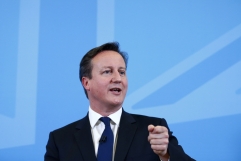It's an iconic moment – the first Christmas of World War One saw British and German soldiers come out of their trenches and fraternise, much to the horror of the top brass who feared it would damage morale. A saccharine, tear-jerking portrayal of the day's events formed easily the most controversial advert of the year.
But, 100 years to the day since it happened, are we quite sure we've got the details of the Christmas Truce right?
Myth 1. People played football.
It's one of the key images of the truce, but it has been convincingly argued by Malcolm Brown and Shirley Seaton in Christmas Truce that they didn't. There might have been impromptu kickabouts with old rags – the Lancashire Fusiliers used a tin of bully beef – but evidence for formal matches between opposing sides is a bit suspect and usually from several decades later.
Myth 2. Everyone took part.
The truce probably took place in about half of the line held by the British Army. Where the fighting had been heaviest and casualties most severe, there was much less incentive to stop for Christmas. Lieutenant C E M Richards, a young officer serving with the East Lancashire Regiment, actually welcomed the "return of good old sniping" late on Christmas Day. Corporal Adolf Hitler of the 16th Bavarians said: "Such things should not happen in wartime. Have you Germans no sense of honour left at all?"
Myth 3. Everyone was full of the Christmas spirit.
Not exactly. Sergeant Blackwood Jones wrote about a comrade who took some tobacco and jam to the Germans, only to be shot in the back as he returned to his trench. "He fell down and said, 'My God, I'm done'," he wrote. "They are dirty cowards, after [our] giving them tobacco." Pat Collard wrote to his parents at The Chestnut Horse pub at Easton, near Winchester, describing a horrendous Christmas under fire, concluding: "Perhaps you read of the conversation on Christmas Day between us and the Germans. It's all lies. The sniping went on just the same; in fact, our captain was wounded, so don't believe what you see in the papers."
Myth 4. It was the first time it had happened.
No. At the beginning of the war, most soldiers on both sides were not the battle-hardened professionals they were to become. They were tired, fed up, cold and a long way from home. There were similar incidents of "peace breaking out" in the Napoleonic Wars, the American Civil War, the American Revolution and the Crimean War.
Myth 5. It was all about selling groceries.
No, Sainsbury's, it wasn't – and trying to turn a profit out of such a beautiful moment is truly tacky.
Even with all these reservations, though, there is something magnificent about the truce. It was the last time in that war that enemies were able to overcome their fears and hostility. It did not take long before too much blood had been shed for anything like it to happen again. But just for a few hours, soldiers – mentally and spiritually, at least – took off their uniforms and became simply men. The generals on both sides were right to fear what had happened, and to take steps to stop it happening again; wars depend on people being able to see uniforms rather than human beings. The Christmas Truce was a moment of clear sight before the fog of war descended again.














